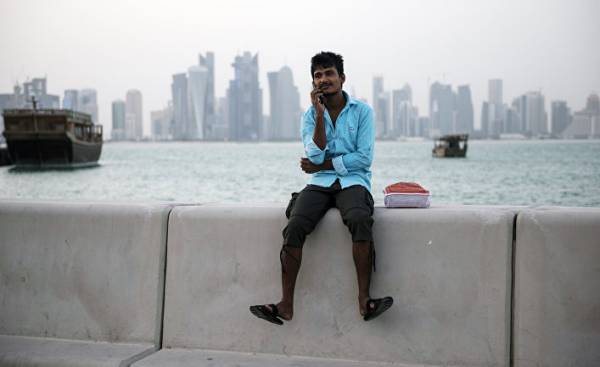
It is hard to imagine that the leaders of Saudi Arabia and the United Arab Emirates thought it would happen. In early June, officials of their governments, and their Junior partners Egypt and Bahrain, has introduced penalties against Qatar and called them problematic, but a necessary step to pacify the pesky Qatar. Like Qatar, accused by neighbors of fomenting extremism, is a naughty child who needs discipline.
But in the adult world of geopolitics, as Saudi Arabia and the UAE against Doha, it seems, did not help them to achieve their goals. Qatar was not isolated, instead, he had strengthened ties with regional powers — Turkey and Iran. Oman and Kuwait, the other two States in the cooperation Council countries of the Persian Gulf, joined in. Food and other goods continue to flow into the docks and the airports of Qatar. And, despite vague reports of the White house, U.S. diplomats seem eager to reconcile and compromise with Qatar and are not going to force Doha to meet the requirements of Saudi Arabia and the Emirates.
“As with the disastrous war in Yemen, Saudi Arabia and the UAE have drastically overestimated the prospects of their success and are unable to make a reliable plan B in case it goes wrong, writes Marc Lynch (Marc Lynch), a specialist on the Middle East in the George Washington University. The group, which opposes the Qatar seem to have overestimated the fear of Qatar before the insulation Board and their own ability to harm his neighbor”.
A new report by The Washington Post this week has compounded the embarrassment faced by the initiators of the blockade. According to anonymous intelligence officials, the United States, the United Arab Emirates were behind the recent controversial government hacking by the news media of Qatar and the social networking sites that helped to provoke the crisis. Crackers attributed false statements to the Emir of Qatar Sheikh Hamad bin TA’mim al-Thani, in which he hailed Iran as an “Islamic government” and praised the Palestinian Islamist group Hamas.
Despite the loud denials of Doha, the scandal has led to the fact that Saudi Arabia, UAE, Bahrain and Egypt have banned the Qatari media, and then severed relations with Doha and began trade and diplomatic boycott. U.S. officials “last week learned that recently analyzed information gathered by US intelligence, confirmed that on 23 may, senior members of the UAE government discussed the plan and its implementation,” report my colleagues Karen DeJong (Karen DeYoung) and Ellen Nakashima (Ellen Nakashima). “Officials said that it is unclear, did the UAE attack yourself or have entered into contracts for their implementation”.
UAE Ambassador to Washington Yousef al-Otaiba (Yousef al-Otaiba) has denied these allegations. “The UAE does not have any relation to the alleged hacking attack described in the article, he said, before repeating the complaints of their country against the foreign policy of Qatar. — To tell the truth about the behavior of Qatar. Funding, support and complicity with the extremists from the Taliban (banned in Russia as a terrorist organization — approx. ed.) to Hamas. Incitement to violence, promoting radicalization and undermining the stability of the neighborhood.”
There are many precedents for rumors and dark insinuations that fuel the tensions in this part of the world. The rupture in relations in 2014 led to a wave of false reports that the citizens of Saudi Arabia and the Emirates were prohibited from visiting Harrods, the London Department store owned by sovereign wealth Fund Qatar.
Analysts explain that the current impasse is a continuation of a long debate and tension with Qatar, which was irritated by larger neighbours that have used their wealth to exert greater influence on the world stage. We are talking about the disputes because of the support of different parties to conflicts from Syria to Libya, and provocative channel “al Jazeera”, financed by the Qatar network, which Riyadh and Abu Dhabi want to close.
Qatar has also chosen a different diplomatic path that differs from the plan of the neighbors. In the country houses offices of such groups as the Taliban and Hamas, to mediate in regional conflicts. “In the background purring of limousines and boats moored in the Bay, Doha has become home to an exotic variety of fighters, financiers and ideologues, a neutral city like Vienna during the cold war or the Persian version of the fictional pirate bar in the movie “Star wars”,” writes Declan Walsh (Declan Walsh) of The New York Times.
“Country has always been a place where settled the homeless, vagrants and unwanted people — The Times said David Roberts (David B. Roberts), author of “Qatar: securing the global ambitions of a city-state” (Qatar: Securing the Global Ambitions of a City-State). On the Peninsula there was no comprehensive power, so if you wanted the Sheikh, you would be able to escape to Qatar, and no one is disturbed.”
Thus the crisis among the rich countries of the Persian Gulf continues. Last week, U.S. Secretary of state Rex Tillerson held a contentious round of diplomatic talks in Kuwait, Qatar and Saudi Arabia in an attempt to defuse the situation. All the countries participating in the conflict — the allies of the United States. Qatar is the largest military base of the United States in the middle East, and Tillerson would prefer to have all calmed down and returned to other matters, particularly the fight against “Islamic state” (banned in Russia as a terrorist organization — approx. ed.). But his efforts have not yielded special fruit.
Tillerson held a public gambit in Doha the signing of a Memorandum of understanding in which Qatar has promised to do everything possible to block funding of extremist groups in the middle East and elsewhere. It quickly turned into a farce. “The Qataris boasted that they were the first in the region to sign such a Pact and called on the Arabs opposed them, to do the same, writes my colleague Carol Morello (Carol Morello). The four countries support the blockade, said that they forced Qatar to sign the Pact and at the same time rejected it as “insufficient” measure to put an end to their embargo.”
On Monday when the UAE denied allegations of hacking attacks, the Saudi Embassy in Washington quoted in a Twitter interview with President trump, where he attacked Qatar. It was further proof of the dissonance between the White house and the State Department in the matter of the crisis — and another reminder that soon the dispute in the Persian Gulf will not stop.







